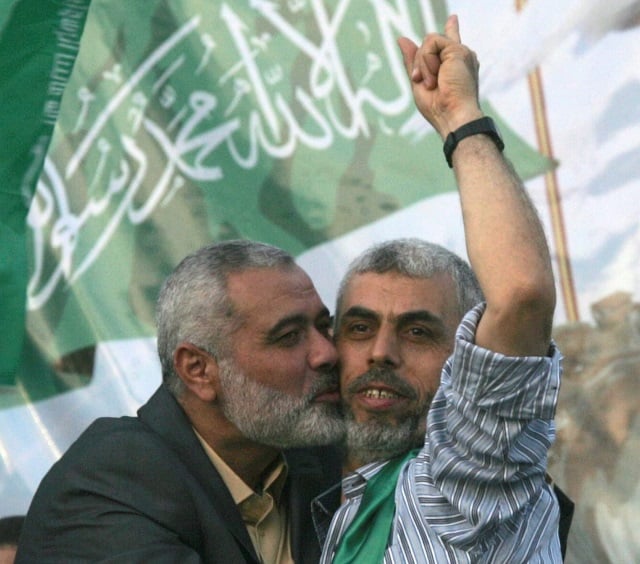Hamas has chosen a radical, even by Hamas standards, to lead it in Gaza. On the War path with Israel?
Yahya Sanwar has been elected to lead Hamas in the Gaza Strip and replace Ismail Haniyeh after internal elections were held for the organization’s institutional and leadership positions, Al Jazeera reported Monday.
Hamas later confirmed the appointment, which placed one of the Islamic terror group’s most hard-line figures in charge of operations in its core power base, the Gaza Strip.
Khalil al-Haya, another political hard-liner, was elected as Sanwar’s deputy.
Sanwar, 54, who is considered hawkish even in Hamas’ terms, was released from an Israeli prison as part of the 2011 deal with Hamas to release abducted IDF soldier Gilad Shalit.
Sentenced to life imprisonment in 1989 for murdering collaborators, Sanwar spent 22 years in jail. Since his release, Sanwar has established himself in Hamas, and gradually became its unofficial but unquestioned leader in Gaza.
In July 2015, Sanwar was entrusted with Hamas’ “Israeli abductees” portfolio. He organized the abduction and subsequent murder of IDF soldier Nachshon Wachsman in 1994, and is reportedly now in charge of negotiations with Israel to facilitate the return of the bodies of two soldiers killed during Israel’s 2014 war with Hamas and two civilians who crossed into Gaza.
He has a reputation of being among Hamas’ most radical leaders. Upon his release, Sanwar called for additional kidnappings of IDF soldiers.
He is opposed to any compromise in Hamas’ policies regarding the Palestinian Authority and Israel. Even from prison, he was one of the main opponents of the Shalit exchange deal because he saw the terms, one IDF soldier for 1,027 Palestinian terrorists, as a surrender by Hamas to Israel’s conditions.
Sanwar is considered to be the link between the military and political wing of the terror organization. He is viewed as a man of great influence in the Izz ad-Din al-Qassam Brigades, Hamas’s military wing, as he was one of its founders.
Despite his high position in Hamas, Sanwar avoids contact with the Arab and Palestinian media. Even though he speaks Hebrew, he does not give interviews to the Israeli press either.
A Nightmare Becomes Reality
According to a report released last week by The IDF Coordinator of Government Activities in the Territories (COGAT), a bitter power struggle in the Hamas leadership, in the center of which stood Sanwar, led to the execution of Mahmoud Ashtiwi, a prominent Hamas field commander in Gaza City, by Hamas.
According to the report, Sanwar and a group of his followers, most of them brigade commanders in Hamas’ military wing, were troubled by the direct and critical approach of the rising battalion commander Ashtiwi and his close ties, in their opinion, with Hamas’ elite in Gaza.
The main targets of Ashtiwi’s criticisms, Al-Deen Al- Hadad, who served as commander of the Gaza City South Brigade and as Ashtiwi’s direct commander, and Raed Saad, formerly the commander of the Gaza City North Brigade and one of the founders of Hamas’s artillery corps, were key players in Sanwar’s radical camp. Ashtiwi, and the opinions he publicized, were perceived as a serious challenge to Sanwar and his men, a challenge that had to be eliminated by every possible means.
Ashtiwi was arrested by Sanwar and held in the Hamas jail for almost a year, until he was executed. Hamas alleged that his execution was on account of “security and moral reasons.”
The sea of rumors that spread in the Gaza Strip during the following weeks speculated on a variety of reasons for his execution: from homosexual relationships and corruption to the argument that became the “unofficial narrative” of the execution, that Ashtiwi had been an agent for Israel’s Shin Bet (Israel’s Security Agency).
“The concern of Sanwar’s possible success troubles many both inside and outside the Palestinian system,” The IDF stated in the report. “A scenario where he and his followers would reinforce their power in the movement, following the elections, causes sleepless nights not only for many of the Hamas leadership, but also for the Palestinian Authority and among Arab entities that have an influence on the Palestinian arena, mainly Egypt, Jordan and even Qatar, who is a main supporter of the movement.”
These nightmares have now become reality.
By: Aryeh Savir, World Israel News


